
When Robin Gibb released “Saved by the Bell” in 1969, he was just 19 — freshly separated from his brothers, standing alone for the first time. Yet from that solitude came a song so haunting, so emotionally pure, that it felt far older than him. “Saved by the Bell” isn’t simply a love song; it’s the echo of a soul caught between hope and heartbreak, light and shadow. Beneath its gentle melody lies the sound of longing — not only for a lover, but for connection, for belonging, for home.
The song opens like a whisper from another time. A soft orchestral swell gives way to Robin’s trembling voice — delicate, mournful, angelic. “I cried for you, I cried for you…” he begins, and already the world stops to listen. His tone carries no bravado, no pretense — only ache. There’s something almost sacred about his phrasing, as though he’s confessing not to the listener, but to himself.
💬 “I thought I was saved by the bell…” he sings, and the words feel like both irony and revelation. Robin always had that gift — to wrap beauty around pain so gently that you didn’t notice your heart breaking until the song was over. In that one line lies everything he was as an artist: tender, tragic, and deeply human. His voice trembles between childlike purity and ancient wisdom — a soul too sensitive for the noise of fame, too honest to hide behind it.
Musically, “Saved by the Bell” is pure melancholy dressed in elegance. The orchestration swells like a cinematic dream — strings sighing, choirs whispering, every note brushing against eternity. The production, rich yet fragile, mirrors the contradictions within Robin himself: the poet and the pop star, the visionary and the wanderer. It’s both intimate and immense — a single heart beating inside a cathedral.
Looking back, the song feels prophetic. Robin’s solo venture might have been born of separation, but it became proof of his singular brilliance. Where Barry was warmth and power, and Maurice was grace and grounding, Robin was introspection — that voice that could make loneliness sound divine. “Saved by the Bell” captured that essence forever. It’s not just a heartbreak song; it’s the sound of a young man finding beauty in loss.
And when we listen now, knowing how life unfolded — the reunions, the triumphs, the grief that followed — the song feels almost like a message across time. You can hear the boy who sang it, and the man he would become: fragile, fearless, eternal.
Because “Saved by the Bell” isn’t about being rescued — it’s about being remembered.
It’s Robin Gibb’s soul, caught forever in that shimmering space between goodbye and grace.